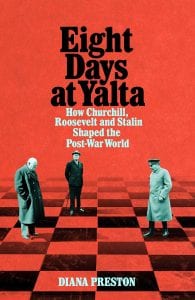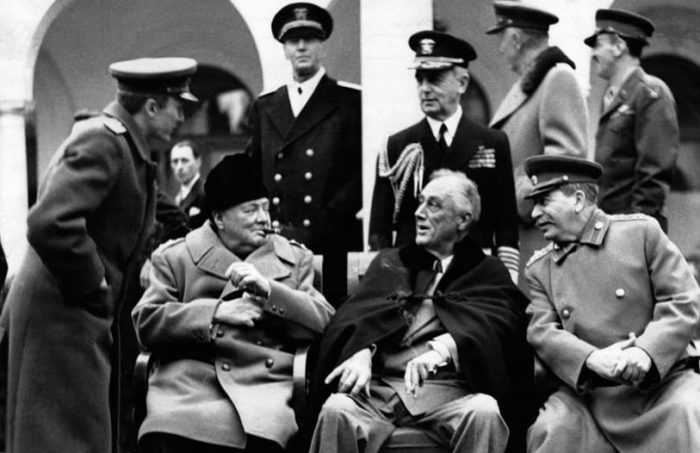By Leah S. Dunaief

Somehow reading about other troubled times makes for good escapism at this weird COVID-19 period of our existence. I just finished a wonderful, non-fiction, carefully researched book by Diana Preston, “Eight Days at Yalta,” and I recommend it for your next page turner.
Even though we all know how WWII came out and how the leaders of the Allies met at Yalta in Crimea to work out the details of the war’s conclusion and the post-war map, the story is still fascinating. The characterizations of Stalin, Churchill and Roosevelt, their interactions, their motivations and their deceptions make for riveting reading. And incidentally, those decisions still affect us today.
Originally scheduled for the end of 1944, the meeting was postponed until February 4-11 of the following year at Roosevelt’s request. He wanted it to happen after he was inaugurated in January for his unprecedented fourth term. Despite his obvious illness, he agreed to travel thousands of miles in the middle of winter, and he got there via train, ship, plane and limo. He was the youngest of the three leaders, at 63, and would die barely two months later. His fragile condition was noted by many of the participants, and he was accompanied by his only daughter, Anna Boettiger, who tried valiantly to protect her father’s health and help him conserve his energies.
Churchill insisted on first meeting Roosevelt at Malta, where the President’s ship, the USS Quincy, delivered him and his entourage to Europe. Though just 17 miles long and nine miles wide, Malta served as a strategic position in the British supply line. As a result, it was subject to constant air raids day and night by German and Italian pilots. Twice the amount of bombs fell on the rocky island as fell on London during the Blitz. No business was discussed there because Roosevelt did not want to give the impression that the two were ganging up on Stalin.
 Churchill, 70 and the oldest, was also accompanied by his daughter, Sarah. The two English-speaking leaders, surrounded by heavy security from both countries, then flew on to Saki, in the Crimea, in separate planes. From there, they set out for the milder climate of Yalta in cars, some 90 miles away. The road was so filled with potholes from bombings that one of the Admirals traveling with Roosevelt complained the ride, which lasted for five hours, “was breaking every bone in his body.”
Churchill, 70 and the oldest, was also accompanied by his daughter, Sarah. The two English-speaking leaders, surrounded by heavy security from both countries, then flew on to Saki, in the Crimea, in separate planes. From there, they set out for the milder climate of Yalta in cars, some 90 miles away. The road was so filled with potholes from bombings that one of the Admirals traveling with Roosevelt complained the ride, which lasted for five hours, “was breaking every bone in his body.”
Stalin, 65, made the 1000 mile trip by rail from Moscow. He disliked flying because his only experience had been a white-knuckled flight across the Caspian Sea to the Tehran Conference, the big three’s previous rendezvous. Both he and Churchill were short and stout, with Roosevelt measuring over six feet when standing. Foreign diplomats were surprised by the dictator’s seeming charm, the softness of his voice and how, unlike others, especially Churchill, he often seemed prepared to listen to what they had to say rather than to speak himself. They concluded the conference liking him. Of the three, he was probably the healthiest.
Roosevelt had two main goals that he wished to obtain from the meeting. He was determined to set the architecture for a lasting peace through the creation of a United Nations. And he desperately wanted the Russian military to join in the fighting against Japan when the war in Europe was won, which happened in April.
The American casualties at Iwo Jima were huge and foreshadowed the terrible cost in lives of an attack on the Japanese homelands. He achieved both but at a loss of Eastern European countries to the Soviet Union. And as it turned out, the United States did not need Russian help in defeating Japan, although as time went on, Stalin hastened to join the fighting, so as to share in the post-war spoils. The President clearly did not understand the coming power of the atomic bomb, which was dropped on Hiroshima only six months later.
There are, according to the author, disconcerting similarities between Stalin and Putin.





